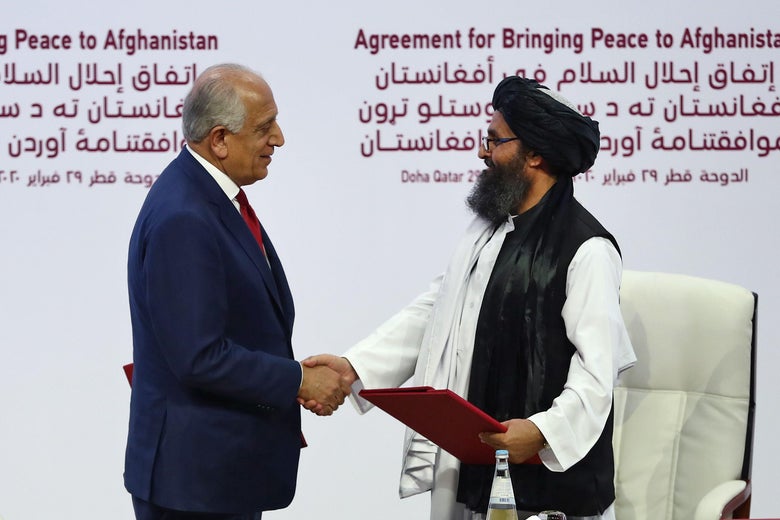
U.S. Special Representative for Afghanistan Reconciliation Zalmay Khalilzad and Taliban co-founder Mullah Abdul Ghani Baradar shake hands after signing a peace agreement during a ceremony in the Qatari capital Doha on February 29, 2020.
KARIM JAAFAR/Getty Images
The United States signed a deal with the Taliban on Saturday that sets out a path to ending America’s longest war, almost two decades after the Sept. 11 attacks. The historic agreement, which was signed in the Qatari capital of Doha, lays out a path that could see American and allied forces withdraw from Afghanistan within the next 14 months. It also marks a key step in allowing President Donald Trump to fulfill his campaign promise to bring U.S. troops home. “If the Taliban and the government of Afghanistan live up to these commitments, we will have a powerful path forward to end the war in Afghanistan and bring our troops home,” President Trump said on Friday.
Under the deal, the United States would cut back the number of troops in Afghanistan from 13,000 to 8,600 over the next three to four months and the rest would withdraw in 14 months. NATO also vowed to cut back on coalition troops, decreasing to some 12,000 from the roughly 16,000 that are currently in the country. “We went in together in 2001, we are going to adjust [troop levels] together and when the time is right, we are going to leave together, but we are only going to leave when conditions are right,” NATO Secretary-General Jens Stoltenberg said.
NATO Secretary General Jens Stoltenberg (L) speaks as Afghanistan’s President Ashraf Ghani (C) and U.S. Secretary of Defense Mark Esper listen during a press conference at the presidential palace in Kabul on February 29, 2020.
WAKIL KOHSAR/Getty Images
The withdrawal of U.S. and coalition troops would depend on the Taliban fulfilling certain key commitments, including cutting ties with terrorist groups such as al-Qaida. It also marks the starting point of negotiations between the Taliban and the Afghan government that are set to begin March 10 and everyone warns will be difficult. “This is a hopeful moment, but it is only the beginning. The road ahead will not be easy. Achieving lasting peace in Afghanistan will require patience and compromise among all parties,” Defense Secretary Mark Esper said.
The deal was signed by U.S. special envoy Zalmay Khalilzad and Taliban political chief Mullah Abdul Ghani Baradar after more than a year of negotiations. Secretary of State Mike Pompeo witnessed the ceremony but didn’t seem to have any direct contact with anyone from the Taliban delegation. Esper, meanwhile, took part in a ceremony in Kabul with Stoltenberg and Afghan President Ashraf Ghani that was held at the same time as the Doha signing. “The future of Afghanistan is for Afghans to determine,” Pompeo said. “The U.S.-Taliban deal creates the conditions for Afghans to do just that.”
(L to R) Oman’s Minister of Foreign Affairs Yusuf bin Alawi bin Abdullah, U.S. Secretary of State Mike Pompeo, and Qatar’s Deputy Prime Minister and Minister of Foreign Affairs Sheikh Mohammed bin Abdulrahman al-Thani attend the signing of a US-Taliban agreement in the Qatari capital Doha on February 29, 2020.
GIUSEPPE CACACE/Getty Images
One of the first challenges that the two sides will face is a planned prisoner exchange that is set to take place before negotiations between Afghanistan and the Taliban are scheduled to begin. The deal calls for Afghanistan to release thousands of Taliban prisoners it has in its custody in exchange for some 1,000 members of the Afghan security forces by March 10. Until now, Ghani’s government has seemed reluctant to move forward with the swap.
Although the deal has long been a key part of Trump’s foreign policy goals for his administration, some experts have warned it is risky because it would give the Taliban international legitimacy. Some Republicans have also warned of the risks of sealing a deal with the Taliban. On Thursday, a group of Republicans released a letter that warned the Taliban has “a history of extracting concessions in exchange for false assurances.”
Readers like you make our work possible. Help us continue to provide the reporting, commentary and criticism you won’t find anywhere else.
Join Slate Plusfrom Slate Magazine https://ift.tt/3cmdSPm
via IFTTT
沒有留言:
張貼留言